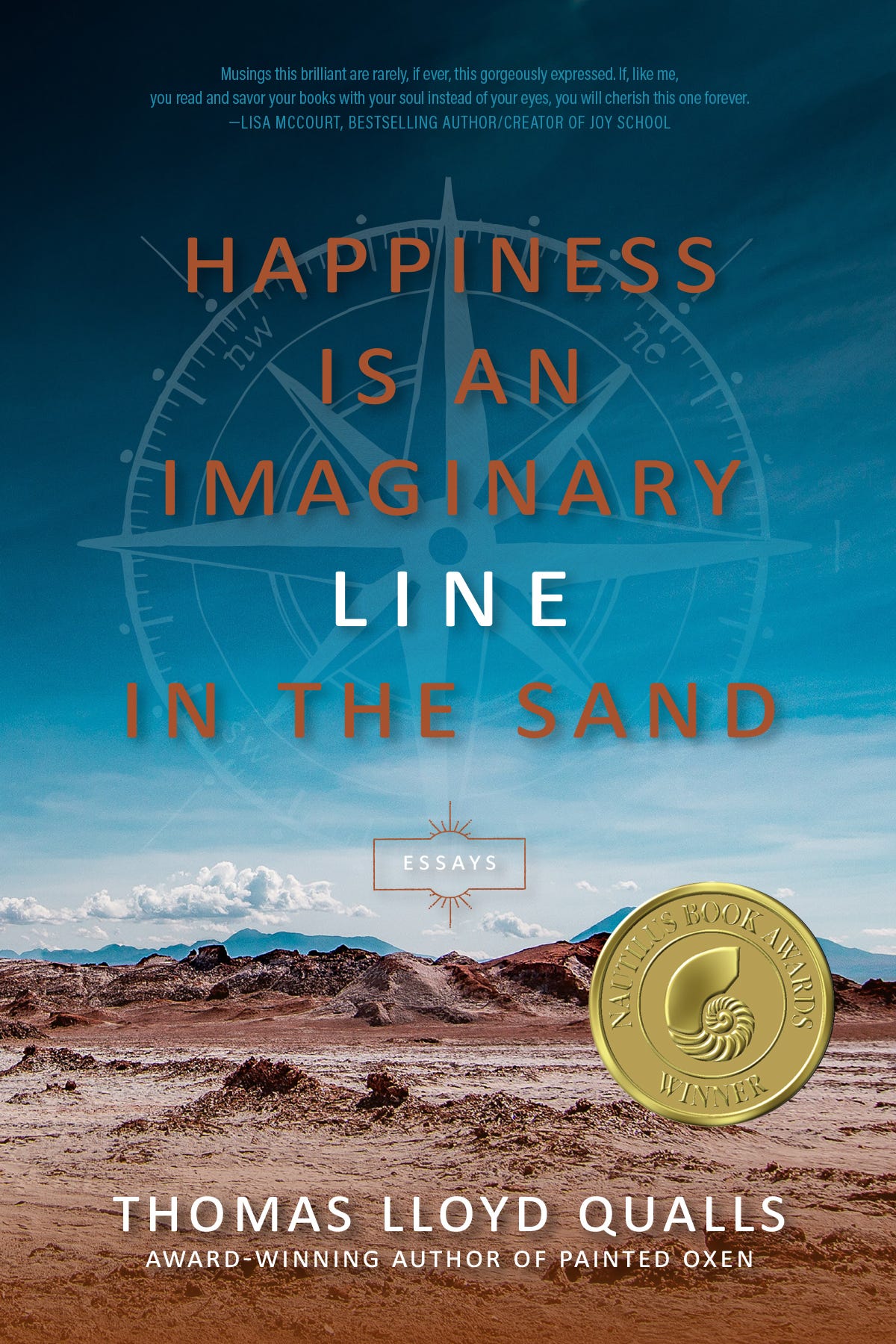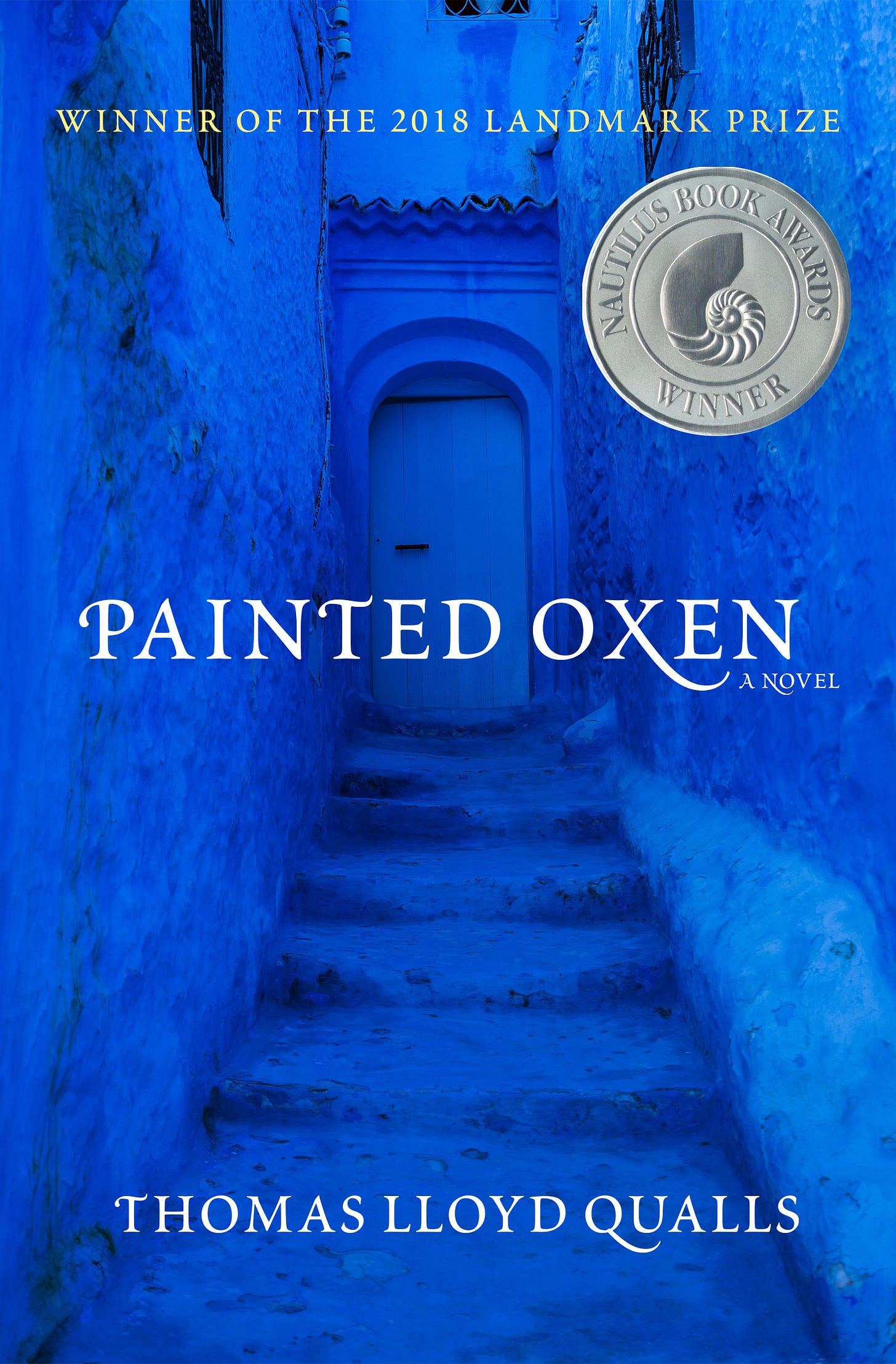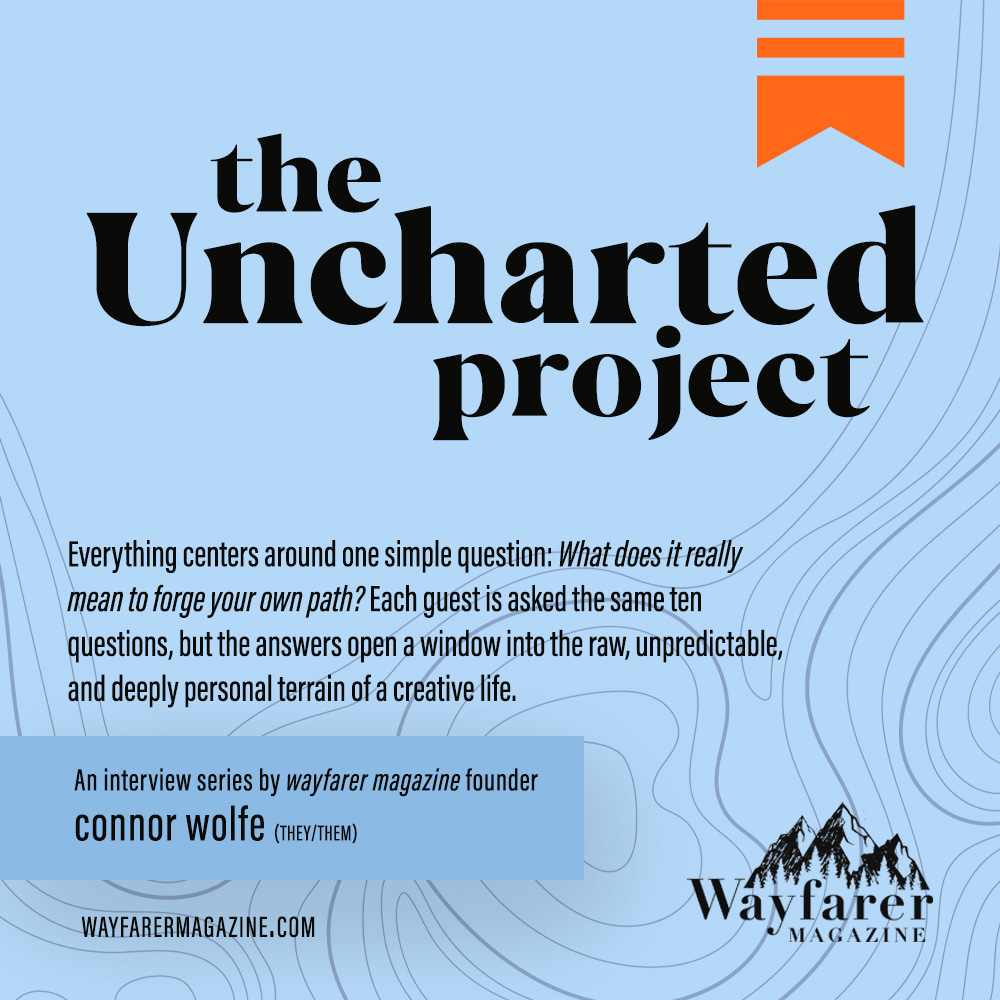UNCHARTED: Thomas Lloyd Qualls
No map. No limits. Just the journey. An interview series by Connor Wolfe
Welcome to Uncharted: No map. No limits. Just the journey, a new interview series from Wayfarer Magazine.
I’m Connor Wolfe, Founder of Wayfarer Books and Wayfarer Magazine, and I created this series around one simple question: What does it really mean to forge your own path? Each guest is asked the same ten questions, but the answers open a window into the raw, unpredictable, and deeply personal terrain of a creative life.
Today, we sit down with author Thomas Lloyd Qualls—a writer by nature, and by all accounts, incurably so.
His debut novel, Waking Up at Rembrandt’s, earned national acclaim, with The Midwest Book Review hailing it as “an impressive debut novel showcasing an undeniably talented and imaginative author.”
His second novel, Painted Oxen, won seven literary awards, including the Landmark Prize for Fiction, a Silver Nautilus Award, and Best New Fiction at the American Fiction Awards.
His third book, Happiness Is an Imaginary Line in the Sand, blends spiritual reflection with poetic insight. Think of it as a portable daily oracle. It received both a Gold Nautilus Award and Best in Small Press.
Across his body of work, Thomas blurs the boundaries between the literary and the mystical, crafting spaces where labels lose their grip. He lives in the high desert of Northern Nevada and holds close Pablo Neruda’s poem Too Many Names.
Q. What’s lighting you up creatively right now?
Thomas: Circular writing. I am crafting a new novel. Which is the third novel in a series. But also the first. It is technically a prequel to the first two. But it is necessary, for purposes of structure and storytelling, that it come last in the series. Also, it is one part modern fiction, one part magical realism, and one part historical fiction. These three aspects create a circle within the novel itself. A novel which is part of a series that is also told in a circle.
Q. What’s the last thing that truly captivated you—an idea, a place, a piece of art, a poem, a moment?
Thomas: I wrote a piece that’s in Happiness Is an Imaginary Line in the Sand about how some of us came into this life with something different, We swallowed lightning in another life. We rode dragons. We parted waters. And we are not so easily contented in this one. I recently came across an Aldous Huxley quote: But I don’t want comfort. I want God, I want poetry, I want real danger, I want freedom, I want goodness. I want sin. How beautiful and perfect is that? I like it when writers tell the whole truth. He wants goodness and sin. That’s real. That’s the thing you’re not supposed to say. And it is so refreshing to read. Because it makes us feel, finally, like we’re not alone.
Q. What’s a recent experience that made you feel deeply present?
Thomas: My fifteen-year-old son recently told me that I was being emotionally cold. I was trying so hard to keep all the wheels on the wagon of our new lives. To make the doctor’s appointments, to pack the fridge and the cabinets with groceries, to pay the mortgage and the HOA and the insurance, and to clean up the leaves. And on and on. To provide the right mix of freedom and boundaries. But teenagers don’t really care about any of that. They look at you and say, in a manner of speaking, why aren’t you here? (Although it’ll probably sound more like Brah, chill.) It was a hard wake-up call to get, given the chaos of my last two years, and, objectively, the more than adequate job I think I have done keeping all the balls from hitting the ground. Nevertheless, it wasn’t something like an impulsive and untrue I hate you that is thrown out in the middle of a fight. I knew he was right. That brought me back to ground zero immediately. And I have been checking myself a lot more regularly to make sure I am showing up as a real human. Not just a robot who can check all the boxes.
Q. What’s a piece of art, a book, or a conversation that’s been living in your mind rent-free?
Thomas: Two things seem to live side-by-side in my psyche right now:
One is Mary Oliver’s Wild Geese. I’ve had a rough last two years or so. I split with my partner of 17 years. We had to sell our house. I had to buy a new and overpriced house close to my son’s school. I have had to learn how to parent my son on my own pretty much full-time. One of my best friends died. I had to move my parents – who live four states away – into assisted living, and then clean out and sell my childhood house. Then my mother died last November. There are other things I can’t talk about yet. Of course, I have not always navigated these challenges with the grace that would’ve been ideal. And so having Mary Oliver’s voice in my ear, as I walk along the river near my house, is comforting. Her telling me, You do not have to be good / You do not have to walk on your knees / for a hundred miles through the desert repenting helps to manage the imperfections of being human. And also, when the geese that dwell along the river call out, as they do often, it is a constant reminder that they are over and over announcing [my] place / in the family of things.
The second thing is the ancient poet Hafiz telling me, Stay close to anything that makes you glad you are alive. This guides so much of my actions and my decisions. It is why I return to the writing page over and over. It informs my decisions about who I spend time with. It makes me come back, again and again, to situations that are difficult, but without which, my life would feel pointless.
Q. What’s the most rebellious thing you’ve ever done in your creative work?
Thomas: It isn’t intentionally rebellious, I don’t think. But all of my novels are quite unconventional. With my first novel, Waking Up at Rembrandt’s, I chose to tell a good portion of the story from the second person. Or rather, that’s how it came out of me. I am not sure I had much of a choice. Also, I juxtaposed the story narratives with poems that inform the story, and fall into three main themes: love, words, and art. In my second novel, Painted Oxen (winner of Homebound/Wayfarer’s Landmark Prize for Fiction), the narratives of the two main characters are framed by dream sequences and tarot archetypes. And the two main storylines are potentially reincarnations or parallel existences. As I mentioned, the third novel also plays with time and space. Did I mention the moon is a character?
Again, I don’t intentionally try to be rebellious. These are the ideas that come to me and the way the stories want to be told. I am simply their willing and faithful servant. Of course, it doesn’t hurt that I have a strong anti-establishment streak. When I was pitching Waking Up at Rembrandt’s, I told an editor about the intercalary poems, she stated emphatically, Oh you can’t combine fiction with poetry. My response was something like, Well, I did. And so far the world hasn’t blown up. Needless to say, the novel did not find a home there.
Q. If your younger self could see you now, what would surprise them the most? What would disappoint them?
Thomas: I think my younger self would be surprised that I have a respectable job, that I have published three books, and that I am not incarcerated. That same self might also be disappointed by the first point.
Q. What is a truth you’ve had to unlearn in order to grow?
Thomas: The meaning of freedom. Most of us, especially us artists, have somewhat childish ideas of freedom. I recently was re-reading old journals from my twenties. I talked a lot about freedom in them. About not selling out. About living free. But I was also poor and had almost no life experience and did not know the first thing about how to navigate the world on my own. And saw modern society as an insurmountable hurdle to the life I thought I wanted to live. Real like is an ongoing balance of freedom and responsibility. From the view of the national stage right now, too many people have a childish view of freedom. Something like 77 million people, it seems. We have responsibilities to ourselves and to each other. Sometimes those responsibilities look like making art that makes other people feel alive or less alone. And there is also a wonderful freedom in doing that. And we still all have to chop wood and carry water, to make sure the electricity bill is paid, and to show up as a real human to your teenager or your aging parent.
Q. What question are you currently trying to answer through your work?
Thomas: How do we transcend ourselves? What if our ideas of what we think our lives should look like are too small? What if the Universe is far more intelligent than we can imagine? It is useful to throw away the maps and follow the road that unwinds before you. See where it goes. We get too fixed sometimes on what we think we should be doing, what we think we want. There is always another road. Step back and take another look around.
Q. What is pulling you forward right now?
Thomas: Hope, to a certain degree. But also, extreme presence. Like I said in response to question 8, sometimes it is worthwhile to throw away the map. Follow an inner compass. Be willing to make it up as you go. Trust that the stars will not lead you astray. Be a true wayfarer.
Q. If your creative work is a map, where does it lead?
Thomas: I never know where I am going. That’s part of the fun. But I am learning to trust the stars.
Connor Wolfe (they/them) is a writer, publisher, and advocate whose work spans over two decades and fourteen titles. Publishing from the margins of literary culture, Wolfe’s work has earned six Pushcart Prize nominations, the Gold Nautilus Medal for Poetry (2015), multiple Foreword Review Book Awards, and the Nautilus Silver Medal for Poetry (2022).
Wolfe is the founder of Wayfarer Books, an independent, trans-owned press committed to amplifying voices historically silenced by the mainstream. Their vision for literature as an act of resistance has shaped the press since its beginnings in 2011. Wolfe has served two terms on the Board of Directors for the Independent Book Publishers Association, delivered a TEDx Talk at Yale University, and completed a degree at Harvard University through grant programs.
After coming out as nonbinary and trans, Wolfe stepped further into national conversations around mental illness, erasure, and creative survival. Holding a degree in Psychology, they also studied Photojournalism under Samantha Appleton, former White House photographer for the Obama administration, sharpening their practice of bearing witness and telling the stories that often go unseen.
In 2024, Wolfe volunteered in the Collections Department of the Museum of Anthropology at Ghost Ranch, assisting in the preparation of sacred objects for repatriation under the revised Native American Graves Protection and Repatriation Act. After wintering off-grid in the high desert in the foothills of Pedernal, they are once again in motion, traveling with their three-legged black cat, momo, writing, documenting, and continuing the long walk home.






